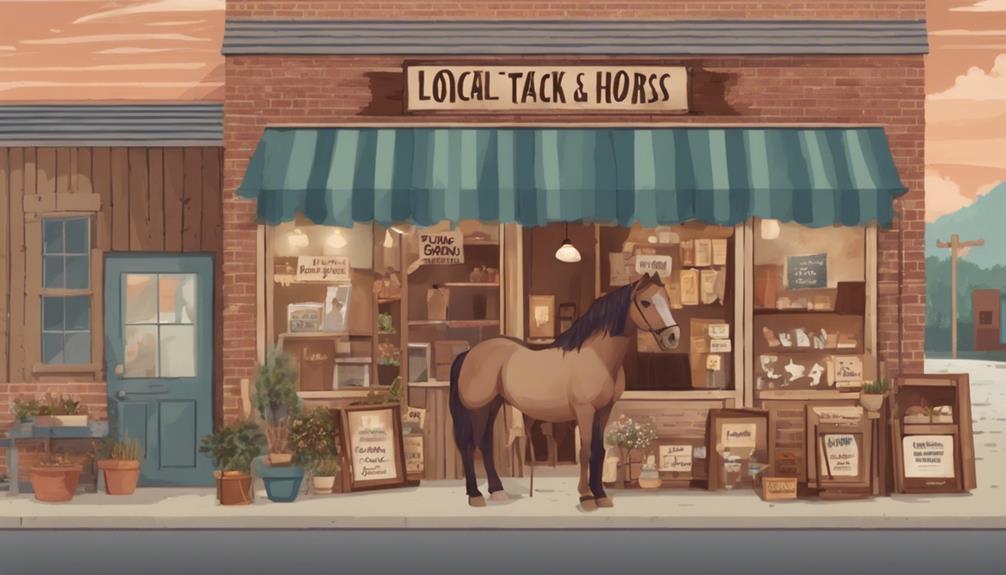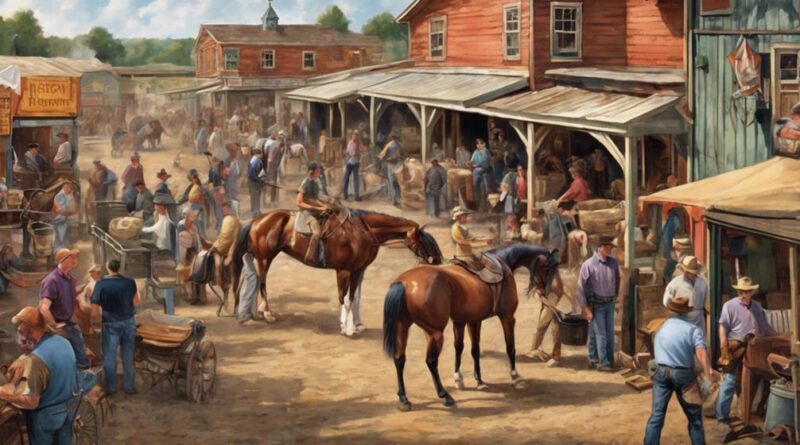What Role Does the Horse Industry Play in Rural Economics?
The horse industry in rural economics is not just a small piece of the puzzle; it's a vast landscape of interconnected opportunities that shape entire communities.
From job creation to boosting tourism, the presence of horses has a ripple effect that goes beyond what meets the eye.
As you explore the various aspects of how horses influence rural economies, you'll uncover a network of benefits that contribute to the sustainability and growth of these areas in ways you might not have considered.
Economic Impact of Horse Industry
The economic impact of the horse industry on rural communities is significant, driving employment opportunities and generating revenue through various sectors. One key aspect contributing to this impact is equine therapy. Equine therapy involves using horses to provide physical, emotional, and mental health benefits to individuals. In rural areas, equine therapy centers not only offer valuable services but also create jobs for therapists, stable hands, and administrative staff, boosting the local economy.
Moreover, breeding programs play a crucial role in the economic stability of rural communities. Breeding farms require a skilled workforce to care for the horses, manage breeding operations, and handle foaling processes. These programs not only support jobs directly related to the breeding industry but also stimulate other businesses in the area, such as feed suppliers, veterinarians, and equipment manufacturers. The revenue generated from breeding programs circulates within the community, contributing to its overall growth and prosperity.
Job Creation in Rural Areas
Amidst the rural landscape, job creation thrives as the horse industry continues to flourish, offering diverse employment opportunities and fostering economic growth. Rural entrepreneurship has been invigorated by the demand for various equine-related services such as breeding, training, veterinary care, and farriery. These businesses not only cater to local horse owners but also attract clientele from urban areas, boosting income streams in rural regions.
Community development has been a key outcome of the horse industry's expansion in rural areas. Riding schools, equestrian centers, and equine events have become central hubs for social interaction and skill-building. These establishments not only create jobs directly related to horse care but also stimulate the growth of supporting industries like hospitality, tourism, and retail. As a result, rural communities experience an influx of visitors and residents seeking to engage in equine-related activities, contributing to the overall vibrancy of the area.
Moreover, the horse industry has provided opportunities for individuals to turn their passion for horses into profitable ventures. Through innovative business models and marketing strategies, many have been able to establish successful equine enterprises, further diversifying the rural job market. Overall, job creation within the horse industry has played a vital role in sustaining rural economies, driving entrepreneurship, and fostering community development.
Revenue From Equine Events
Hosting equine events can significantly boost revenue streams for rural communities, creating opportunities for economic growth and community engagement. These events attract participants and spectators, leading to increased spending on accommodations, food, and other local services, which in turn stimulates the local economy. Moreover, revenue from equine events can have a ripple effect, benefiting various businesses in the community.
Sponsorship opportunities are key in generating revenue from equine events. Local businesses can sponsor these events, gaining exposure to a targeted audience of horse enthusiasts. In return, sponsors receive visibility through banners, announcements, and advertisements, enhancing their brand recognition within the community. This mutually beneficial relationship not only supports the events financially but also strengthens ties between businesses and the equine industry.
Effective marketing strategies play a crucial role in maximizing revenue from equine events. Utilizing social media, targeted advertising, and partnerships with local organizations can help promote these events to a wider audience. By creating engaging content and highlighting the unique aspects of each event, organizers can attract more participants and spectators, ultimately increasing revenue.
Contribution to Agriculture Sector
Boosting revenue through equine events not only benefits local businesses but also plays a significant role in contributing to the agriculture sector. The horse industry's impact on agriculture goes beyond entertainment and sport. Here's how it contributes:
- Diversification of Agricultural Partnerships: By integrating horses into traditional farming practices, such as using them for plowing fields or managing livestock, agricultural partnerships are strengthened. This symbiotic relationship between horses and agriculture fosters innovation and sustainability in rural communities.
- Economic Boost through Rural Investment: The horse industry stimulates rural investment by creating demand for agricultural products like hay, grains, and pasture land. This increased demand not only supports local farmers but also encourages agricultural growth, leading to a more robust and resilient rural economy.
- Enhanced Environmental Stewardship: Horses play a vital role in maintaining and managing natural landscapes. Through practices like rotational grazing and manure recycling, they contribute to soil health and biodiversity. This focus on sustainable land management showcases the horse industry's commitment to environmental stewardship within the agriculture sector.
The horse industry's involvement in agricultural partnerships and rural investment underscores its significance in supporting and enhancing the agricultural sector, ultimately contributing to the overall economic vitality of rural communities.
Tourism Boost in Rural Communities
The horse industry in rural areas draws in tourists seeking authentic experiences and natural beauty, bolstering local economies and cultural heritage. Local attractions such as horseback riding tours, equestrian events, and farm visits offer visitors a chance to immerse themselves in the rural lifestyle. These experiences not only provide entertainment but also educate tourists about the importance of horses in agriculture and local traditions.
Moreover, the horse industry promotes cultural exchange as tourists interact with local communities, farmers, and horse breeders. Visitors get to learn about different horse breeds, training techniques, and the historical significance of horses in the area. This cultural exchange enriches the experiences of both tourists and locals, fostering mutual respect and understanding.
Property Value and Land Use
Investing in equine facilities can significantly enhance property value and optimize land use in rural areas. When considering the impact of the horse industry on rural economics, it's crucial to understand how it influences property value and land use. Here are three key points to consider:
- Land Conservation: Equine facilities often prioritize open spaces and natural landscapes, contributing to land conservation efforts in rural areas. By preserving large tracts of land for horse-related activities, these facilities help maintain the rural character and natural beauty of the region.
- Zoning Regulations: The presence of equine facilities can influence zoning regulations in rural communities. Local authorities may develop specific zoning ordinances to accommodate horse-related activities, which can lead to more structured land use planning and development in the area.
- Property Value Enhancement: Properties with equine facilities or suitable land for equestrian purposes tend to have higher market value in rural areas. The demand for such properties from horse enthusiasts can drive up real estate prices, benefiting the overall property value in the region.
Supporting Small Businesses

To foster economic growth in rural areas, consider supporting small businesses within the horse industry. Equine entrepreneurship plays a vital role in sustaining rural economies by creating jobs, attracting tourism, and preserving the cultural heritage associated with horses. By investing in local equine businesses, you can help stimulate economic activity in rural communities and contribute to their overall prosperity.
Rural partnerships are essential for the success of small businesses in the horse industry. Collaborating with local farms, equestrian centers, and other related businesses can create a network of support that fosters growth and innovation. By working together, small businesses can access shared resources, reach a broader customer base, and benefit from collective marketing efforts. These partnerships not only strengthen the individual businesses involved but also contribute to the economic development of the entire community.
Supporting equine entrepreneurship in rural areas is a win-win situation. Not only does it help small businesses thrive, but it also enhances the overall economic landscape of the region. By investing in and promoting small businesses within the horse industry, you aren't only supporting local entrepreneurs but also contributing to the sustainability and growth of rural economies. So, consider partnering with equine businesses in your area and be a part of driving economic success in rural communities.
Sustainability and Rural Development
Considering the importance of sustainability in rural development, it's crucial to implement eco-friendly practices within the horse industry to ensure long-term prosperity. As the horse industry is deeply intertwined with rural economies, focusing on sustainability can have a significant positive impact on both the environment and the community. Here are three key ways in which environmental conservation and community engagement can drive sustainable rural development within the horse industry:
- Implementing Green Practices: By adopting eco-friendly practices such as sustainable land management, water conservation, and waste reduction, the horse industry can minimize its environmental footprint and contribute to the preservation of rural landscapes.
- Promoting Community Engagement: Encouraging active participation from local community members, including farmers, residents, and businesses, can foster a sense of shared responsibility for environmental stewardship. Collaborative efforts such as organizing clean-up events, educational workshops, and eco-tourism initiatives can strengthen community bonds while promoting sustainable practices.
- Supporting Wildlife Conservation: Protecting natural habitats and wildlife populations within rural areas is essential for maintaining biodiversity and ecological balance. Through initiatives like creating wildlife corridors, restoring native vegetation, and implementing wildlife-friendly fencing, the horse industry can play a vital role in safeguarding the environment for future generations.
Frequently Asked Questions
How Does the Horse Industry Impact Mental Health and Well-Being in Rural Communities?
When you explore how the horse industry impacts mental health in rural areas, you'll discover significant benefits. The calming presence of horses fosters mental well-being, offering a unique form of therapy.
Additionally, engaging with horses can create strong community connections, providing a sense of belonging and support. Through these interactions, individuals in rural communities often find solace and a renewed sense of purpose, contributing positively to their overall mental health and well-being.
What Are the Environmental Implications of the Horse Industry in Rural Areas?
In rural areas, the horse industry has environmental implications. Land conservation and sustainability are essential to balance the impact.
Proper waste management is crucial to avoid pollution.
It's crucial to consider these factors to ensure the industry's sustainable growth while minimizing harm to the environment.
How Does the Horse Industry Contribute to Youth Development and Education in Rural Regions?
When it comes to youth empowerment and education initiatives in rural regions, the horse industry plays a crucial role.
By offering opportunities for young people to learn about horse care, riding, and competition, the industry fosters valuable skills like responsibility, teamwork, and perseverance.
Additionally, programs that involve horses often provide a hands-on approach to education, teaching important lessons in a unique and engaging way.
What Role Does the Horse Industry Play in Preserving and Promoting Local Culture and Heritage?
When it comes to preserving traditions and promoting local culture, the horse industry plays a crucial role. Through events, festivals, and shows, the industry helps keep heritage alive and celebrates the unique aspects of rural communities.
How Do Advancements in Technology and Innovation Impact the Horse Industry and Rural Economies?
When it comes to the horse industry, technology and innovation are revolutionizing the way things operate. Advancements like digital health monitoring for horses, automated feeding systems, and online marketplaces for buying and selling horses are changing the game.
These innovations not only streamline processes within the industry but also have a significant impact on rural economies by creating new job opportunities and boosting local businesses.
Conclusion
Overall, the horse industry plays a crucial role in rural economies by:
- Creating jobs
- Generating revenue from events
- Supporting small businesses
- Boosting tourism
It contributes to the agriculture sector, increases property values, and promotes sustainable rural development. With its diverse economic impact, the horse industry is a vital component of rural economies, driving growth and prosperity in these communities.
